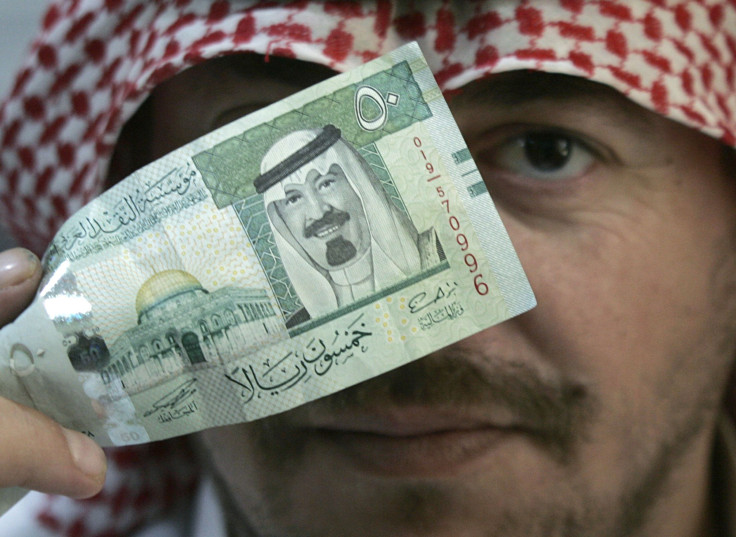Saudi Arabia’s Bad PR Fuels Talk Of Riyal Devaluation

DUBAI, United Arab Emirates (Reuters) -- Speculation that Saudi Arabia could devalue its currency may owe more to a poor public-relations effort by Saudi authorities than to the economic pressures on the kingdom. Riyadh has the tools available to protect itself as low oil prices push the current account and budget balances of the world's top crude exporter deep into deficit, senior bankers in Saudi Arabia and the Gulf said.
In private conversations with Reuters this week, the bankers -- many of whom are in contact with Saudi authorities -- said Riyadh may detail a strategy to cope with an era of cheap oil as soon as next month, when the finance ministry presents the 2016 budget plan. The prospect of a riyal devaluation remains far-fetched, they said.
Political sensitivities and a culture of government secrecy have so far prevented officials from publicly discussing the likely policy options, keeping financial markets guessing about Riyadh's response to the sustained oil-price slump. At $45.71 per barrel, Brent crude is down 20 percent this year after tumbling from above $115 last year.
Nervous investors are hedging against the risk that Saudi Arabia could abandon its three-decade-old peg of 3.75 riyals to the dollar. The riyal fell in the forwards market this week to its lowest since 1999, after the price of credit default swaps covering Saudi sovereign debt surpassed those insuring against a Philippines default.
"A lot of uncertainty has to do with the size of the fiscal deficit expected this year," said Monica Malik, chief economist at Abu Dhabi Commercial Bank. As the government introduces spending cuts and other deficit-curbing measures, "this should help ease worries," she said.
The central bank and finance ministry did not respond to requests for comment on policy.
Malik said steps expected next year, including an end to one-off state salary bonuses and the introduction of a land tax, could cut the budget deficit to around 10 percent of gross domestic product from the current 20 percent. That would allow Saudi Arabia to slow the drawdown of its foreign assets, a major focus for the pessimists.
Apocalyptic Times
The kingdom faces tougher economic times, the regional bankers said -- but not to the point of being forced to break its currency peg. Their view is at odds with some analysts at major Western financial institutions, who are discussing a looming Saudi devaluation in apocalyptic terms.
"If Saudi cannot resist the gravitational forces created by a persistently strong U.S. dollar and depegs the riyal to follow the Russian or Brazilian currencies, oil could collapse to $25 per barrel," Bank of America Merrill Lynch wrote this week.
In fact, Riyadh is determined to avoid devaluation at almost any cost, the Gulf bankers said. The resulting market panic and import cost surge would outweigh the benefit to state finances from higher oil revenue after conversion from dollars to riyals.
Saudi Arabia imports much of its food, consumer goods and machinery, and their rapid price inflation could stoke political discontent in the event of a devaluation.
The state has reserves to support its currency for years to come. With Brent averaging $57.55 a barrel between March and September, the central bank's foreign assets shrank at an annual rate of $87 billion, leaving it holding $647 billion. Even if the asset depletion accelerated, it would take several more years to reach $225 billion, or a generous 18 months of import cover -- twice the cushion most nations enjoy.
Such arithmetic does little to ease market jitters, however, when Saudi officials have yet to explain how they will handle the pressure. Rare public pronouncements have so far been confined to general assurances of economic health, leaving many investors unconvinced.
This month, as dwindling oil receipts drove interbank money rates to their highest levels since 2009, the central-bank governor brushed off what he called a "slight" rise in rates, insisting that banks had liquidity aplenty. Borrowing costs have since risen further.
Domestic Sensitivity
In a country renowned for government secrecy, reluctance to engage with the markets may have been heightened by leadership changes ushered in with new King Salman's accession in January. His son, Mohammed bin Salman, has taken over much of the economic-policy apparatus just as it grapples with an oil-price slump whose extent may have caught officials off-guard. The last serious bout of market speculation on a Saudi devaluation was handled by their predecessors, in 1998.
Another reason to keep likely countermeasures under wraps is their political sensitivity. Curbing public-sector wages, trimming subsidies and slowing construction projects would hit the lavish welfare policies that have helped maintain Saudi Arabia's social peace.
In a sign of their delicacy, Oil Minister Ali al-Naimi has toned down comments last month that domestic energy prices may have to rise. He softened his stance a week later with assurances that there was no dire need for reform and that citizens' welfare would be protected.
However, domestic political hurdles will not deter Riyadh from any necessary steps to shore up financial stability, according to those in regular contact with its officials.
Soon after next month's budget announcement, the government is expected to publish a multiyear blueprint for economic development in a cheap-oil context, said a senior executive at a major Saudi financial firm. "This will answer many of the questions people have and should show that the talk of devaluation is overblown," he said.
(Reporting by Andrew Torchia; Additional reporting by Celine Aswad and Archana Narayanan in Dubai; Editing by Laurence Frost)
© Copyright Thomson Reuters 2024. All rights reserved.











